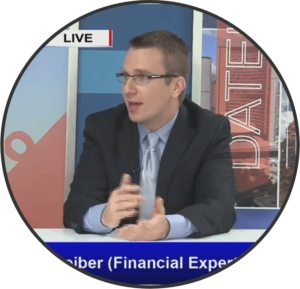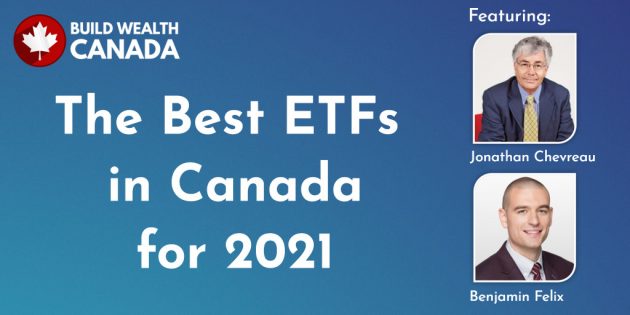An interesting analysis of the annual MoneySense ETF All-stars feature is now available on a one-hour podcast interview hosted by BuildWealthCanada.ca’s Kornel Szrejber, with myself and PWL Capital’s Ben Felix. Click on this highlighted text for the full session: The Best ETFs in Canada for 2021.
Initially, the interview is audio-only, available through iTunes and the usual podcast services. Later there will be a version that also shows video.
The full 2021 edition of the ETF all-stars can be found here at the MoneySense site, and the Hub’s summary here. The feature appeared early in April.
There are various links to the ETFs, including the ticker symbols (most of them trading on the TSX).

After kind introductions of both me and Ben Felix, both of us then added a few more details about our careers before Kornel started the formal interview. He did so by asking about the general philosophy behind the All-Stars and the mechanics of how we got eight ETF experts to agree on designating roughly 50 ETFs (from a universe of near a thousand) as ETF All-Stars.
The philosophy underlying the All-stars
As I explain in the MoneySense overview, the feature – now in its 8th year – aims to help individual investors (with or without the assistance of advisors) whittle down the overwhelming choice of ETFs now on the market. The goal has never been to whipsaw investors with change for the sake of change, but rather we strive to pick “buy and hold” broadly diversified low-cost ETFs that can be held over the years and ideally the decades.
Except for the individual “Desert Island Picks” (see below), generally the idea has been to avoid flavor-of-the-month theme funds or regional equity ETFs too narrowly focused on single countries (apart from Canada and the US). As a result, we try to keep the list to a manageable number that don’t necessarily change with every passing year. Of course, once in a while there is a “game-changer” that requires a revamp: the Asset Allocation ETFs from Vanguard Canada and subsequently its major competitors being the best example.
We also assume our readers are probably not day traders but looking for low-cost manageable portfolios that might be tweaked annually but likely won’t welcome a total revamp of their investments every year. We assume some are DIY investors buying them from discount brokerages, some have full-service advisors (including shops like PWL Capital), and some are hybrid investors who largely invest on their own but like to validate their approach through perhaps a fee-only advisor.
How the panel “votes”
As for the mechanics of choosing the ETFs, as I tell Kornel, the eight expert panelists simply debate by email or Slack and “vote” on a spreadsheet. We have four teams of two each and once each team agrees, we try and find a consensus among the four teams. So 5 out of 8 votes would carry the day: I myself don’t vote unless there is a 4-4 tie and the tie needs to be broken.
After the introductory chat, there is a brief interlude where Kornel describes his own personal transition to financial independence and semi-retirement, and addresses his own personal ETF picks, and why he holds his emergency cash with EQ Bank (as does our family).
Discussion of the major ETF picks by category
We then move into the major category picks, starting with Canadian equity ETFs and on to the US equity and international equity picks. Kornel notes that many previous picks have returned and asks some fairly probing questions that only an ETF expert like Ben Felix can properly answer.
The discussion gets pretty granular once we cover the tradeoffs of using single funds that cover most of the world, versus mixing and matching funds from various categories. As Felix notes, some people don’t want the hassle and prefer only a few ETFs, while other investors almost enjoy the process of building their own portfolio, almost like a hobby.
We also get into the weeds on equal-weighted ETFs and low-volatility ETFs (both championed by BMO ETFs.)
We also explore the increasingly popular One-Decision Asset Allocation ETFs pioneered by Vanguard, and soon followed by iShares, BMO and Horizons.
Desert Island picks
Finally, Kornel asks about the Desert Island picks, which debuted a couple of years ago, as a way of letting individual panel members champion particular picks that may not be agreed up on by the panel as a whole. For example, Cutthecrapinvesting’s Dale Roberts this year picked the Purpose Bitcoin ETF. Meanwhile, and as Kornel probes in the Zoom call, Ben Felix and partner Cameron Passmore picked this year two small-cap value ETFs from Avantis (US and International), which investors can consider to be a type of intellectual spin-off of Dimensional Fund Advisors.
Bonds and Bond ETFs
Near the end, we discuss the “return-less risk” of fixed income these days and the fact that this year we actually reduced the number of fixed-income ETFs. (With the ever present threat of rising interest rates, the panel is increasing nervous about long-term bonds and “aggregate” bond ETFs that hold too many long-term bonds.
We close with a discussion of financial advice and the various advice models ETF investors can use.
All in all, I think I can say that between Kornel’s probing questions and Ben’s insightful answers, this interview covers a lot of ground. It is a nice supplement to the basic MoneySense ETF All-Stars package.



